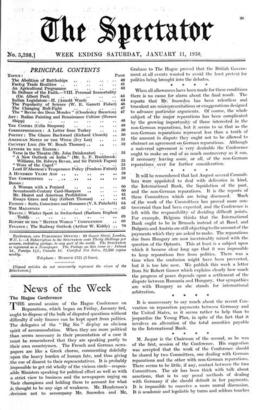It will be remembered that last August several Commit. `tees
were appointed to deal with deliveries in kind, the International Bank, the liquidation of the past, and the non-German reparations. It is the reports of these Committees which are being discussed. Much of, the work of the Committees has proved more con- troversial than had been expected, and the Conference is left with the responsibility of deciding difficult points. For example, Belgium thinks that the International Bank ought to be in' Brussels instead of at Basel, and Bulgaria and Austria are still objecting to the amount of the payments which they are asked to make. The reparations due from Hungary are now inextricably mixed with the question of the Optants. This at least is a subject upon which it became clear long ago that it was impossible to keep reparations free from politics. There was a time when the confusion might have been prevented, but it is too late now. We publish this week a letter from Sir Robert Gower which explains clearly how much the progress of peace depends upon a settlement of the dispute between Rumania and Hungary. Our sympathies are with Hungary as she stands for international arbitration. * * * *






































